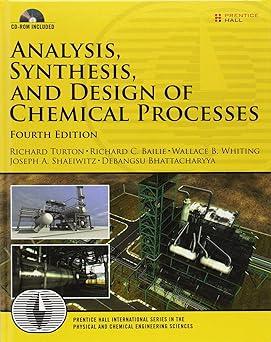A heat exchanger was put into service approximately one year ago. The design conditions are that process
Question:
A heat exchanger was put into service approximately one year ago. The design conditions are that process gas is cooled from \(100^{\circ} \mathrm{C}\) to \(50^{\circ} \mathrm{C}\), with cooling water entering at \(30^{\circ} \mathrm{C}\) and exiting at \(40^{\circ} \mathrm{C}\). Initially, the heat exchanger operated satisfactorily, meaning the temperatures for the cooling water and process streams were the same as the design conditions given above. However, over time, it has been observed that, due to impurities in the gas stream, a fouling layer of dirt has built up on the outside of the tubes. This dirt layer has caused the temperatures through the heat exchanger to change, and, in order to maintain the process gas outlet temperature at \(50^{\circ} \mathrm{C}\) with the same design gas flowrate, the mass flow of water has had to be increased to \(150 \%\) of the design flow, with a corresponding change in cooling water outlet temperature. Assuming that, for the design case, all the resistance to heat transfer is on the process-gas side, estimate the fouling heat transfer coefficient for the current operation as a fraction or multiple of the gas-phase heat transfer coefficient.
Step by Step Answer:

Analysis Synthesis And Design Of Chemical Processes
ISBN: 9780132618120
4th Edition
Authors: Richard Turton, Richard C. Bailie, Wallace B. Whiting, Joseph A. Shaeiwitz, Debangsu Bhattacharyya





